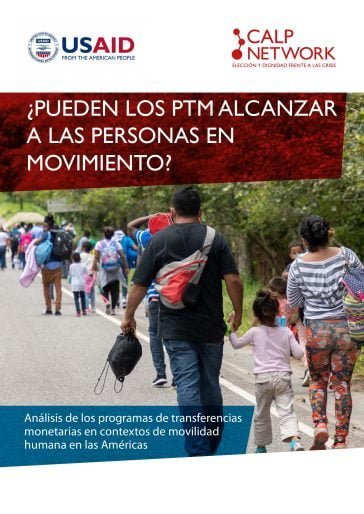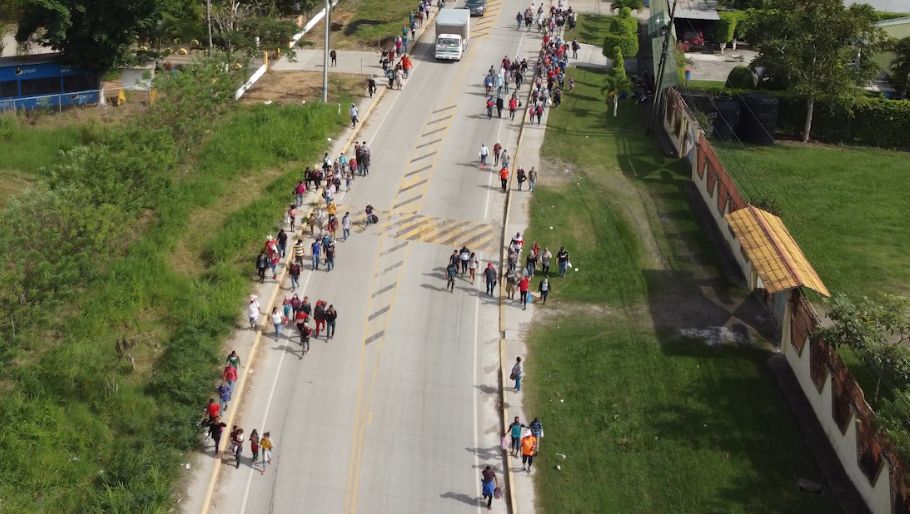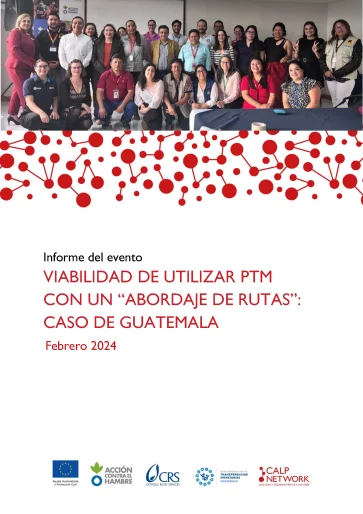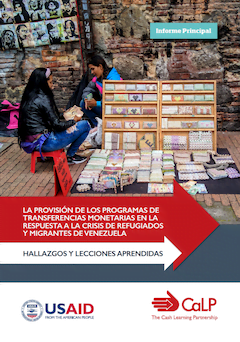Los PTM y la movilidad humana
Los programas de transferencias monetarias (PTM) se utilizan con frecuencia para satisfacer las necesidades de los migrantes en crisis. Esta página sirve de espacio para albergar materiales relacionados con los PTM y la migración.

La Cruz Roja se prepara para prestar asistencia humanitaria a los migrantes que están listos para salir de Honduras hacia Guatemala como parte de una caravana de migrantes. ©Johannes Chinchilla / IFRC.
Los conflictos, las crisis económicas y las catástrofes naturales han obligado a las personas a emprender arduos y arriesgados viajes a través de múltiples fronteras en busca de seguridad y medios de subsistencia. En 2020, el número de personas desplazadas por la fuerza alcanzó la cifra récord de más de 80 millones, casi el doble que una década antes. Esta tendencia está empeorando y los efectos del cambio climático amenazan con desplazar hasta 200 millones de personas para 2050.
Cada vez se utiliza más los programas de transferencias monetarias (PTM) para satisfacer las necesidades de las personas en movimiento. Se ha utilizado a gran escala en diversos contextos, desde las crisis migratorias europeas de 2015 hasta “los caminantes” de Venezuela. Igualmente, se ha utilizado en otras crisis migratorias mixtas, como las de Centroamérica, el Sahel, el Mediterráneo y el Cuerno de África. En la actualidad, los PTM son una de las principales formas de asistencia a las poblaciones en movimiento en Ucrania y los países de su entorno.
Hay muchas perspectivas y definiciones sobre lo que significa ser un migrante y cómo deben responder los trabajadores humanitarios. Por el momento, no utilizamos una única definición, ya que el debate sobre los PTM y la migración se encuentra en su fase inicial y el lenguaje está evolucionando.
Documentar y compartir evidencias ayudará a mejorar la eficacia de la respuesta. Esta página contiene una útil selección de recursos relacionados con los migrantes y el uso de los PTM. Se actualizará a medida que evolucionen las conversaciones en los espacios humanitarios de PTM.
Prioridades actuales
Nuestro objetivo es contribuir al progreso de esta cuestión mediante:
- El apoyo a la generación de pruebas a nivel regional y mundial;
- contribuyendo a la búsqueda de soluciones prácticas para la entrega de PTM a las poblaciones migrantes; y
- convocando un debate basado en la evidencia sobre las cuestiones clave.
Contenido destacado

Elaboración de un enfoque basado en rutas migratorias para el uso de los PTM: viabilidad en determinados contextos de las Américas
Informe
Esta investigación analiza la viabilidad de un enfoque basado en rutas para los programas de transferencias monetarias (PTM) en las Américas, presentando su potencial a través de tres perspectivas: personas en movimiento, organizaciones humanitarias y proveedores de servicios financieros (PSF).

¿Los PTM pueden alcanzar a las personas en movimiento? Análisis de los programas de transferencias monetarias en contextos de movilidad humana en las Américas
Informe
Este estudio propone una nueva visión para alimentar el análisis sobre la implementación de los programas de transferencias monetarias (PTM) para la asistencia en contextos de movilidad humana en la región de las Américas.

Cuatro razones para utilizar un enfoque basado en la ruta para los programas de transferencias monetarias
Blog Post
Dado que la movilidad humana es un hecho en la mayoría de las crisis humanitarias, ¿es hora de cambiar de un enfoque de país a un enfoque basado en rutas? Con cuatro puntos clave, Holly Welcome Radice argumenta que ha llegado el momento de un enfoque basado en rutas.

Esto no es un simulacro: la asistencia en efectivo y la movilidad humana
Blog Post
En este blog, Paula Gil Baizan presenta tres nuevos lentes a través de las cuales podemos ver la movilidad humana. Expone cómo estos lentes se cruzan con los programas de transferencias monetarias, con un enfoque particular en las Américas.

Informe del Evento Viabilidad de Utilizar PTM con un “Abordaje de Rutas”: Caso de Guatemala
Meeting minutes
En 2022, CALP reconoció la importancia del tema de movilidad humana y PTM invitando a su red a contribuir a la evidencia y debate. CALP realizó el estudio ¿Los PTM pueden alcanzar a las personas en movimiento? Análisis de los programas de transferencias monetarias en contextos de movilidad humana en las Américas que examinó el uso de los PTM con las personas en movimiento. También...

Hallazgos y Lecciones Aprendidas en la Provisión de Programas de Transferencias Monetarias en Respuesta a la Crisis de Venezuela en Colombia y Ecuador
Guía y herramientas
El webinar sobre el análisis de las lecciones aprendidas en la provisión de programas de transferencias monetarias en Colombia y Ecuador en respuesta a la crisis de Venezuela se llevó a cabo el viernes, 24 de julio. Este evento fue organizado conjuntamente por the CALP Network y el Grupo de Trabajo Regional sobre Programas de Transferencias Monetarias que forma parte de la Plataforma...

Programas de transferencias monetarias y movilidad humana: Compartiendo experiencias, debates y aprendizajes
Informe
Los PTM han sido uno de los compromisos del Grand Bargain en los que másse ha avanzado. Se debe tener en cuenta que los retos a los que nos exponenlos distintos contextos humanitarios también nos obligan a mejorar y a revisarestas modalidades de ayuda, en situaciones complejas. Los grandes flujos demovilidad humana necesitan con urgencia un diseño de soluciones enfocadasen transformar el...

Estudio de Inclusión Financiera de Refugiados y Migrantes Venezolanos y Población Local en las Ciudades de Lima (Perú), Quito y Guayaquil (Ecuador)
Informe
El presente Estudio de Inclusión Financiera se realiza en el marco de la implementación del Proyecto de Inclusión Económica en Perú y Ecuador, financiado por USAID e implementado por el Consejo Mundial – WOCCU dirigido a promover el acceso a servicios financieros de población refugiada y migrante venezolana y local. Tiene como propósito conocer las características
y necesidades...

La Provisión de Programas de Transferencias Monetarias en la Respuesta a la Crisis de Refugiados y Migrantes de Venezuela: Hallazgos y Lecciones Aprendidas – Informe principal
Informe
Esta consultoría, para la cual se recopiló información entre marzo y abril de 2020, busca documentar las lecciones y las buenas prácticas sobre la entrega de PTM en Colombia y Ecuador por parte de actores humanitarios y gobiernos, en respuesta a la crisis de refugiados y migrantes de Venezuela. Este informe tiene como propósito catalizar el aprendizaje generado hasta el momento con el...
Latest
No se encontraron resultados
No hay contenido disponible en este momento.


